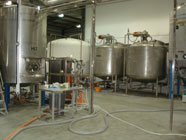The Upper Tribunal (Lands Chamber) has reduced the assessment of the Double Maxim Brewery at Houghton-le-Spring, County Durham. The decision in Double Maxim Brewery Limited v Smith (VO) (2015) UKUT 0078 (LC) concerned the correct rateable value for a small brewery occupying a converted industrial unit. The Valuation Tribunal for England determined that the rateable value should be increased from £57,000 to £60,000 with effect from 1 April 2010 and the ratepayer appealed against this determination.
The appellant ratepayer produced alternative valuations relying respectively upon: the revised rent agreed for the property; a value based on barrelage produced; comparison with the assessments of other breweries; comparison with the assessments of other industrial units; and a contractor’s basis of valuation. Based on these alternative approaches the appellant contended that the rateable value should be reduced to £27,100.
The respondent Valuation Officer considered that the property should be valued as an industrial unit by reference to the rents and agreed assessments of other industrial units. She also compared this evidence to the assessments of other breweries in the north-west of England. The respondent asked the Tribunal to dismiss the appeal and to confirm the assessment of rateable value £60,000 determined by the Valuation Tribunal for England.
The Upper Tribunal found that, valuing the property vacant and to let with any non-rateable plant and machinery ignored, the evidence of rents was to be preferred to a receipts and expenditure basis or to a contractor’s test basis of valuation. The evidence showed that smaller breweries were valued by reference to rents of industrial units. The correct mode of occupation to be valued was that of brewery. The Tribunal considered that the rent on the appeal property should be examined in the light of other rents. The evidence in the immediate locality was to be preferred and it was correct to apply an end allowance to reflect the layout of the appeal property. The assessment should be reduced to rateable value £52,000 from 1 April 2010.
This decision supports the view that rental evidence should be preferred to other methods of valuation in cases where there is a sufficient body of relevant rental evidence to arrive at a valuation.

